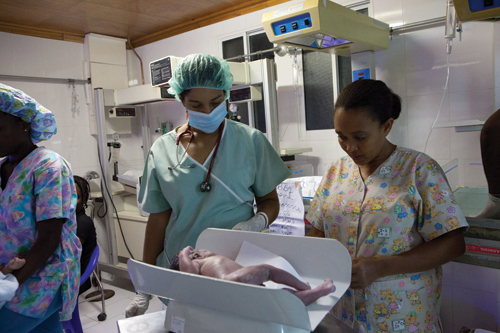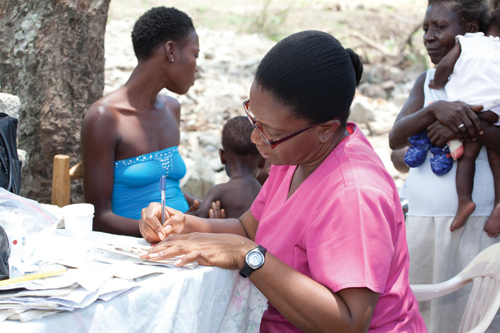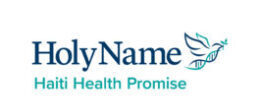 By Abdel Alexus
By Abdel Alexus
Director of Human Resources, Hôpital Sacré Coeur
The measure of any hospital is the quality of its staff. No matter how much is spent on a hospital’s physical plant, pharmacy and general services, a mediocre staff will mean—at best—a mediocre hospital. Since Hôpital Sacré Coeur has sought throughout its history to be the preeminent medical institution in northern Haiti, the recruitment and retention of excellent staff has been among our very highest priorities.
With the strong support of The CRUDEM Foundation and its sole member, The Holy Name Medical Center Foundation, the leadership of Hôpital Sacré Coeur has made real and substantial progress in building a recruitment and retention program worthy of a hospital of our caliber.
Hospitals in Haiti are not easy places to work. And Hôpital Sacré Coeur is no exception. Through our doors come all of the problems of a developing country. Our employees work under circumstances that can make even the best of them frustrated and unmotivated. Our hospital’s leadership has taken steps to improve working conditions and differentiate Hôpital Sacré Coeur from other institutions. For example, a modern kitchen and dining area was recently built on the grounds of the hospital to provide healthy, subsidized meals to staff. Many employees, particularly those who live in Cap-Haïtien, must leave home very early to arrive at the hospital in time for their shift.
 Often they do not have time to bring meals from home. Because of the cost of food at the markets outside the hospital, many staff members routinely deny themselves a meal in order to provide for extended family or meet other financial obligations.
Often they do not have time to bring meals from home. Because of the cost of food at the markets outside the hospital, many staff members routinely deny themselves a meal in order to provide for extended family or meet other financial obligations.
Since a hungry employee is usually not a productive employee, the subsidized meal program addresses an important barrier to good performance. This employee benefit also sets Hôpital Sacré Coeur apart from other hospitals in Haiti, where subsidized employee meal plans are uncommon.
Another recent employee benefit has been the addition of three employee on-call rooms, each with two double beds that adjoin the new employee lounge and dining area. These rooms allow physicians and nurses to rest during breaks, especially those providing services at night. Prior to the construction of these rooms, on-call staff had no place to rest when they were not needed on the wards. The new rooms are a tangible sign that hospital leadership values on-call staff and understands the stress inherent in those jobs.
In the past several months, a duplex housing structure was built on the CRUDEM campus to accommodate two key employees and their families. One unit is occupied by Dr. Michele Paul-Hanna, Head of the Department of Pediatrics and her family. The other unit is occupied by Dr. Jerry Bernard, Head of the Department of Surgery, and his family. Dr. Bernard’s wife, Nadine, is also a physician employed at Hôpital Sacré Coeur.
Providing housing to staff is an excellent retention tool and we hope to build additional units on the CRUDEM campus as funds become available.
The government of Haiti has increased the tax burden on all citizens by 2 percent. Since our staff—and most Haitians—live paycheck to paycheck, this is an enormous burden. With the support of The CRUDEM Foundation and the Holy Name Medical Center Foundation, wages at Hôpital Sacré Coeur were adjusted to offset this tax hike. This was not an approach uniformly adopted by other organizations, especially hospitals, in Haiti. And, the decision to gross up wages in response to the new tax was very well received by staff.
 While these initiatives have helped to differentiate Hôpital Sacré Coeur from the other institutions with which we compete for staff, additional measures are necessary to improve staff recruitment and retention. For example, a significant percentage of the hospital’s staff live in Cap-Haïtien, more than 10 miles from Milot. Public transportation, as you know it in the United States, does not exist in Haiti. But there are private bus and van services as well as motorcycles, but transportation by these means is prohibitively expensive for most staff. Over the years, the hospital has tried to help by providing a Cap-Haïtien shuttle twice a day. But the hospital’s motor pool has only one small bus that is unreliable and insufficient for the need. We are exploring the possibility for acquiring a larger, newer bus to provide morning and evening transportation to staff living in Cap-Haïtien. If we are able to offer this benefit, we will have addressed one of the major retention issues for nursing and administrative staff, in particular.
While these initiatives have helped to differentiate Hôpital Sacré Coeur from the other institutions with which we compete for staff, additional measures are necessary to improve staff recruitment and retention. For example, a significant percentage of the hospital’s staff live in Cap-Haïtien, more than 10 miles from Milot. Public transportation, as you know it in the United States, does not exist in Haiti. But there are private bus and van services as well as motorcycles, but transportation by these means is prohibitively expensive for most staff. Over the years, the hospital has tried to help by providing a Cap-Haïtien shuttle twice a day. But the hospital’s motor pool has only one small bus that is unreliable and insufficient for the need. We are exploring the possibility for acquiring a larger, newer bus to provide morning and evening transportation to staff living in Cap-Haïtien. If we are able to offer this benefit, we will have addressed one of the major retention issues for nursing and administrative staff, in particular.
Since most Haitians live paycheck to paycheck, cashflow is a major concern for hospital staff at certain times of the year, especially late summer and fall when tuition for the next school year is due. There is no adequate public school system in Haiti and so most families must pay annual school tuition as well as purchase uniforms and supplies. As a result, many employees at Hôpital Sacré Coeur ask the accounting department for payroll advances. Others resort to local lending institutions to borrow money at extremely high monthly interest rates in order to satisfy some of their most urgent needs. If not paid-off quickly, a loan obtained in this way can burden an employee with an almost unbearable amount of debt. Hospital leadership is exploring different ways to address the cashflow problem that many employees face at certain times of the year. One approach would be to establish a fund to make small, interest-free loans to employees secured by futures earnings. Such a benefit would send an important signal to employees. One that would likely yield results in terms of recruitment and retention.
Recruiting the best employees in the market and retaining them is a struggle for any organization, but especially for those with very limited resources. Even with the generous support of The CRUDEM Foundation and it donors, Hôpital Sacré Coeur cannot compete with the salaries offered by government agencies and even many NGOs. But the decision to join an organization and remain with it is about much more than just wages.
As has been the case throughout our history, we can attract and retain first-rate employees by consistently striving to make Hôpital Sacré Coeur the best place to work in the north. This means caring for our employees and addressing, to the extent we can, the everyday problems they face trying to do their jobs and provide for their families.
The initiatives discussed in this brief article give you some idea of the effort we are undertaking to recruit and retain staff by showing in concrete ways just how much we value their contributions.









